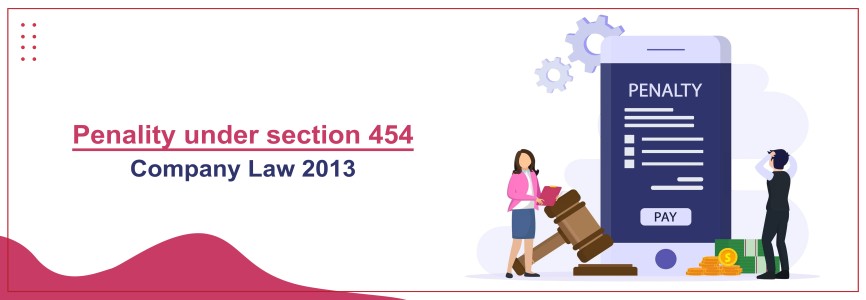Penalty for non constitution of a Corporate Social Responsibility Committee u/s 135 of the Companies Act 2013
The Companies Act, 2013 establishes the rules for companies in India. It aims to balance business freedom with accountability by defining responsibilities for companies, their directors, and key managers. If a company does not follow the Act or the rules made under it, penalties apply. When no specific penalty exists, Section 450 serves as a general penalty clause.
This case involves Jainam Broking Limited, a public company in Gujarat, which admitted it had failed to create a Corporate Social Responsibility (CSR) Committee for nearly two years, even though it was required by law. The Registrar of Companies (ROC), Ahmedabad, who acted as the adjudicating authority, issued an order under Section 454 imposing penalties on the company and its officers.
This order reflects how regulators handle failures in corporate governance when requirements are missed or delayed. It also emphasizes the increasing importance of CSR obligations under Indian company law.
Facts of the Case
Jainam Broking Limited is registered under CIN U67120GJ2003PLC043162 with its office in Gandhinagar, Gujarat. The company changed from a private company to a public limited company on 9 November 2021. Due to its financial performance, it exceeded the net profit threshold that triggered obligations under Section 135(1) of the Companies Act, 2013, related to CSR.
According to its financial statements for 2020-21, the company's net profit was over five crore rupees. This meant that after becoming a public company, it was required to create a CSR Committee. Since this committee must include at least one independent director, the company also needed to appoint independent directors.
However, the company did not set up the CSR Committee right away. It appointed an independent director, Mr. Bhuvnesh Sunderlal Vilayatrani, only on 24 April 2023. Then, on 12 September 2023, the board reconstituted the CSR Committee with the necessary number of directors. As a result, the company was out of compliance with Section 135(1) from 9 November 2021 until 12 September 2023.
The company acknowledged this default. On 5 March 2025, it filed a suo motu application in Form GNL-1, asking for adjudication of the non-compliance. A hearing was set for 2 May 2025. At the hearing, the company stressed that the default was not intentional and resulted from delays in appointing independent directors following its conversion to a public company.
The ROC reviewed the records and concluded that the company did indeed default for nearly two years.
Issues Raised
The adjudication raised several questions.
-
Whether Jainam Broking Limited was statutorily required to constitute a Corporate Social Responsibility (CSR) Committee upon (or soon after) its conversion into a public company, once its net profit crossed the statutory threshold.
-
Whether subsequent appointment of an Independent Director and re-constitution of the CSR Committee cures the company’s past default (and, therefore, extinguishes liability) for the period of non-compliance.
Relevant Sections
-
Section 135(1)- Section 135(1) mandates that every company with a net worth of five hundred crore rupees or more, a turnover of one thousand crore rupees or more, or a net profit of five crore rupees or more during any financial year must form a CSR Committee of the board. For public companies, this committee must include at least one independent director. This provision ensures that companies meeting certain financial criteria dedicate resources to social responsibility under board-level oversight.
-
Section 450- Section 450 states the general penalty for violations when no specific penalty is outlined. It indicates that a company or officer in default is liable for a penalty of ten thousand rupees and, for ongoing violations, an additional penalty of one thousand rupees for each day after the first day of the violation, up to a maximum of two lakh rupees for a company and fifty thousand rupees for an officer. This provision ensures that no breach of the Act goes unpunished just because a specific penalty is not defined.
-
Section 454- Section 454 gives the ROC the authority to act as the adjudicating officer to impose penalties under the Act. It outlines the adjudication process, the right to appeal to the Regional Director, and the consequences of failing to pay penalties.
Together, these sections clarify that Jainam Broking Limited and its officers were responsible for penalties during the time they did not create a CSR Committee.
Judgment
The ROC Ahmedabad ruled that Jainam Broking Limited violated Section 135(1) from 9 November 2021 to 12 September 2023 by not forming a CSR Committee. Although the company later corrected the default, the violation persisted throughout the default period and required penalties. The suo motu application was seen as an admission of default.
The penalties were set as follows:
-
On Jainam Broking Limited: Rs.2,00,000
-
On Dishant Milanbhai Parikh (DIN 07761167): Rs.50,000
-
On Meghavi Rajesh Gonawala (PAN CACPG2098A): Rs.50,000
-
On Mittal Narendrabhai Shah (PAN EJHPS8587L): Rs.50,000
-
On Milan Suresh Parikh (DIN 00085061): Rs.50,000
-
On Anal Milan Parikh (DIN 01404198): Rs.32,000
-
On Vidhi Dishant Parikh (DIN 07788145): Rs.50,000
The order required payment of the penalties within ninety days through the Ministry of Corporate Affairs’ e-Adjudication portal. It also stated that penalties on directors and officers had to be paid from their personal earnings.
The order allowed for an appeal to the Regional Director, Ahmedabad, within sixty days of receipt by filing Form ADJ along with a certified copy of the order. It further warned that not paying the penalties within the set time would lead to consequences under Section 454(8).
Final Note of the Article
The ROC Ahmedabad’s ruling against Jainam Broking Limited serves as a reminder that CSR obligations are not just symbolic, but legally binding. The failure to create a CSR Committee for nearly two years after becoming a public company and exceeding the net profit threshold was seen as a clear violation. The penalties Rs.2,00,000 on the company and various amounts on individual officers show that accountability is both institutional and personal.
This case highlights that compliance must be ongoing and immediate once a company crosses legal thresholds. Later efforts to correct the situation do not erase liability for the period of non-compliance. Companies need to plan for CSR responsibilities from the outset.
The order also illustrates how seriously regulators are enforcing CSR rules. It sends a strong message to the corporate world: lapses in CSR compliance will result in penalties, regardless of intent, and directors themselves will be held personally accountable just like the company.











































































_crop10_thumb.jpg)


































































_crop10_thumb.jpg)
_crop10_thumb.jpg)



_crop10_thumb.jpg)


_crop10_thumb.jpg)





_crop10_thumb.jpg)

_crop10_thumb.jpg)














-suratgujarat-section-158_crop10_thumb.jpg)
-suratgujarat_crop10_thumb.jpg)
-(33)_crop10_thumb.jpg)



-ahmedabad_crop10_thumb.jpg)
-learn_crop10_thumb.jpg)

-learnn_crop10_thumb.jpg)



























































_crop10_thumb.jpg)























_Guidelines_learn_crop10_thumb.jpg)























_learn_crop10_thumb.jpg)
_crop10_thumb.jpeg)










_crop10_thumb.jpg)




_Second_Amendment_Rules,_2025_learn_crop10_thumb.jpg)







_learn_crop10_thumb.jpg)












































_learn_crop10_thumb.jpeg)























_learn_crop10_thumb.jpg)



_rd_roc_learn_crop10_thumb.jpg)
















_learn_crop10_thumb.jpg)














_learn_crop10_thumb.jpg)
_Learn_crop10_thumb.jpg)










































_learn_crop10_thumb.jpg)




_learn_crop10_thumb.jpg)













_crop10_thumb.jpeg)


















